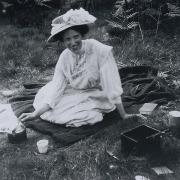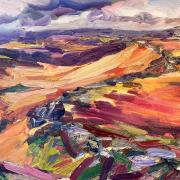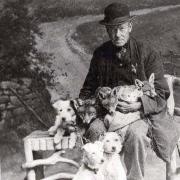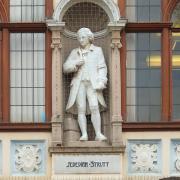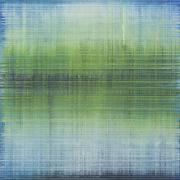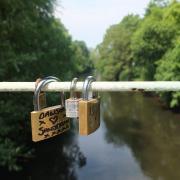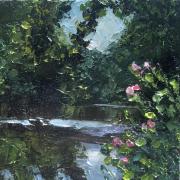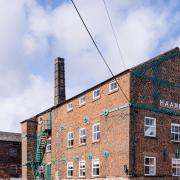Patricia Greene has starred in Radio 4's The Archers for 54 of its 60 years. She talks to Pat Ashworth about her childhood in Derby and distinguished career
It’s an unmistakeable voice that fans of The Archers on BBC Radio Four hear almost every day of their lives, and I recognise it in conversation in the corridor even before Patricia (Paddy) Greene MBE enters the room. She has had a busy morning recording at the BBC’s Birmingham studios, and tomorrow she’ll be among prominent cast members meeting the Duchess of Cornwall in the programme’s 60th anniversary year.
It was the voice that got her the part of Jill Archer 54 years ago, and if she can’t quite believe she’s been in the series that long, there’s ample evidence in the archive pictures on display in the BBC foyer. The rural setting of The Archers is a far cry from Paddy’s own upbringing. Her mother’s forebears were Irish but her grandfather came to Derby to serve as a butler in the Georgian house she believes later became the Friary Hotel on Friargate.
His family lived on Stafford Street, where three houses had been bought for the groom, the butler and another member of the household staff. ‘My father was brought up there most of his life, and his sisters too. That was where we went for Christmas Day because they had an upstairs loo and it was rather smart,’ Paddy remembers. She was born in Allenton but subsequently moved to Campion Street and went to Ashbourne Road Infant School and then to St Paul’s Junior School when the family moved to Kirk Street, Chester Green.
Life was never easy. ‘We were dirt poor. I was born in 1931 in the middle of the slump, and my poor father, who couldn’t sell a loaf of bread to a starving man, is down on my birth certificate as a piano salesman,’ she says in disbelief. ‘I once went with him to buy a pair of shoes, and we got home and he said his feet were hurting. I said, “They’re new shoes!” He said, “They’re a bit small – I didn’t like to ask the girl to get another pair out.” That was my father. A piano salesman? In a slump? I don’t think he ever sold a single one.’
An only child, the last time she visited the city was to bring home her mother’s ashes. She’s recently been reading about the Roman history of Chester Green and remembers the excitement of finding Roman coins when the air raid shelters were being dug at the outbreak of the Second World War.
‘Derby was extremely friendly,’ she remembers. ‘We lived in a terrace house and we’d knock on the wall for the little girl next door to come round. We’d sit looking after ourselves while the parents went to the pub – no babysitting then. And when we were a bit older after the war, my father would say, “Right, we’ll do a walk.” We’d go down to Derby station, a crowd of us, all different ages and classes, and we’d get on the train as far as Bakewell or somewhere, and walk to Lathkill Dale or Matlock. It was wonderful.’
Shopping was at Derby’s fruit and vegetable and fish markets, ‘and then the other market where you got everything else, clothes, seconds. My mother would send me down to Mabel’s pot stall, where you could get wonderful bone china or a casserole for five bob.’ Paddy would love to have shopped at Bracegirdle’s but had to be content with clothes run up with material from the market. ‘I can remember one wonderful summer when my mother said, “Here’s two pounds,” and I brought two dresses, eighteen and a penny each, pure cotton. They went on and on,’ she says with satisfaction.
Make do and mend extended to school uniform when Paddy won a scholarship to Parkfield Cedars School. She had a proper blazer, she says with pride, but her misshapen hockey boots – ‘which weren’t hockey boots at all’ – had belonged to a flat-footed boy from Derby School. School blouses were WAAF seconds which her mother dyed green. ‘It was a very strict uniform,’ she recalls. ‘White ankle socks even when you were 18! And those hideous knickers, with white ones underneath, and we used to have to play tennis with all the boys leering through the railings...’
She remembers the strictness of the head mistress, Miss Stead, whose study carried the faint aroma of cigarettes most likely smoked out of the window, and the choir of 500 girls who performed ambitious songs like the ‘Flower Song’ from Carmen on Speech Days. ‘Proper church services’ each morning made all the girls familiar with hymns and doxologies. When Paddy and a schoolfriend found themselvesyears later at Miss Stead’s funeral in the crypt of Canterbury Cathedral, where she had become a tour guide on retirement, it was extraordinary, she remembers, to sing those same hymns again.
She was destined to have become a schoolteacher if her Latin hadn’t let her down. She left school and became a ward orderly at the Children’s Hospital before going to work in the sheet metal factory of Hawk Industries in Derby. It wasn’t a success. ‘One day, the boss sent for me and told me, “You are never going to make a secretary.” I didn’t want to be a secretary. And that’s the day I decided that whatever happened, I was going to go on the stage.’
She’d been heavily involved in amateur dramatics, directed in Derby by John Dexter, who was later to become associate director of the English Stage Company and to direct Sir Laurence Olivier and other luminaries in some of their greatest roles. ‘He’d been invalided out of the army, but he was a very good director, and he was merciless with all of us amateurs. He got some very good performances out of us. We didn’t do ordinary plays, we did good stuff,’ Paddy remembers. She would ‘rehearse and rehearse and rehearse’ and then not be able to be in the play at the last minute because her school objected – ‘And then we’d get my cousin in to do my lines. So I wasn’t at all encouraged.’
But there were plenty of role models: Alan Bates was in her drama society and Dexter took her to meet actors when they came to perform in Derby. Her father was against his daughter going on the stage, telling Paddy she wouldn’t get a penny from him. ‘Nor did I, in three years at drama school,’ she says cheerfully. ‘But my mother used to send a letter with a ten bob note in it occasionally.’
She won a place at the Central School of Speech and Drama in London, based at that time in the Royal Albert Hall. ‘Bliss,’ she says. It was 1951 and the Festival of Britain. ‘Suddenly you were in London and every theatre was giving of its best... We spent our lives walking into town and queuing for cheap seats; we saw fabulous productions.
‘The food was appalling and horrible and I looked like a skeleton: it was the one and only time in my life that I’ve ever been thin. But I never stopped laughing. None of us had any money. At the end of my first term, I wrote a letter to the Derby Evening Telegraph telling them what it was like living on half a grant in London and sleeping on people’s floors – and by next term, I had a full grant.’
Graduating students went less into the West End, more into what Paddy describes as the ‘slough of despond’ of actors looking for work. Like the majority of others, she ended up in weekly rep, touring the Welsh valleys and the remote north of England, where the manager would instruct the troupe to ‘top and tail’ it on a Saturday night so that they could all catch their trains home. ‘You did the first and last line of a speech. In a mystery, you missed a lot of the plot... but he never missed his train.’
She finally got her heart’s desire when she was invited to Oxford Playhouse, ‘which was posh, and I really wanted to be a classical actress’. And that’s where she received a telephone call from the producer of The Archers, inviting her to audition for the part of Jill. The fee was seven guineas an episode and she was getting seven pounds a week in rep. ‘The BBC said they’d wait six weeks for me and everyone said, “You’ve got to do it.” I said, “But I’ve got this tour, opening in Venice, really good stuff...”
‘The script was a rather domineering woman who was demonstrating a machine called the Household Drudge at a garden fete, but it was put to me as “a sexy blonde in a tea tent,”’ she remembers. ‘There was a row of proper radio actresses at the audition and I thought, I’m the loser here. But I played against the lines and did it as Fenella Fielding might do it.’
She got the part and the rest, as they say, is history. ‘Isn’t life full of ironies?’ she says. She never wanted to do the wireless at all and at her first lesson at Central was told by the tutor, John Richmond, ‘You’ll never broadcast. You sound like a fairy in hockey boots.’ The voice is rich and clear and warm and husky, and if she sounds like Judi Dench, it’s not surprising, she says.
‘Everyone who went to Central has the same voice. We had a faaaabulous voice teacher,’ she says with a drawl. ‘I had a tiny little Midlands accent and she was really good. You had to go into the body of the Albert Hall, and the head of school would sit back and say, “Throw your voice to Row E of the circle. Your voice is an instrument and you must learn to play it.” It was the era when you had to learn posh, really. When I joined the BBC, we all had voices like Sylvia Peters and when you hear the old tapes now, they are hilarious.’
Jill Archer is Britain’s most famous farmer’s wife, now a farmer’s widow after the demise of her fictional husband, Phil. His death was an inevitable consequence of the death in 2009 of Norman Painting, the actor who had played him since the beginning of the series. The death scene was acclaimed for its tenderness and poignancy, as Phil died peacefully at home, listening to his favourite piece of music, Elgar’s Dream of Gerontius.
‘A very sensitive director and it was beautifully written,’ Paddy acknowledges. ‘Even I was a bit moved and you never are when you hear yourself, ever. He was in the sitting room in a chair, and we had the chair. So although Norman wasn’t there, I could see him sitting in it with the half cold cup of tea at the side of him. And because it was there and because my own husband had died, I was kind of used to death by then, and that was all right.’
After more than half a century, how much of Jill is in Paddy and how much of Paddy in Jill, I wonder? ‘I think what I gave Jill was a sense of humour. She didn’t have much of one, and I have,’ she reflects. ‘As you well know, she is a very good woman. Of my two grandmothers, one was a saint – fat and round, and she cooked – and the other was Irish, feckless and naughty. So between the two of them, I feel myself going one way or the other. And because of Jill, I’ve gone on to the good one really, for the last 40 years of my life.’
Scripts arrive at her home in the Thames Valley a week before recording, and a car comes to fetch her to Birmingham. ‘I can’t drive up and back again any more, so they send a car. That is fabulous, and I’m most grateful,’ she says. ‘Lucky me. It’s a wonderful life.’
Favourite place in Derbyshire ‘It’s got to be the Peak District. I’ve got so many memories and it was so beautiful. What a wonderful county. And I used to love the museum: Bonnie Prince Charlie and all that; and those wonderful pictures of people by Joseph Wright of Derby. I used to stand in front of those for hours.’



